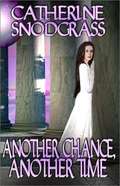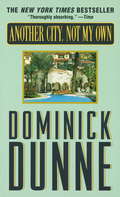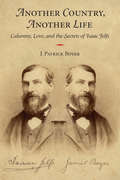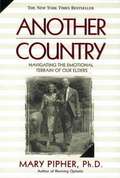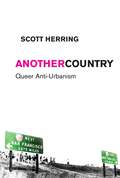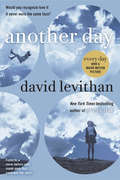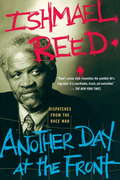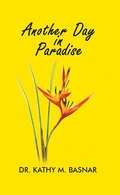- Table View
- List View
Another Chance with You (The DuGrandpres of Charleston)
by Jacquelin ThomasHer former husband was the love of her life—Except he isn’t her ex!Retired Secret Service agent Landon Trent stuns Jadin DuGrandpre with the announcement that they’re still married. Even as passion reignites, winning back Jadin’s trust won’t be easy—especially when a trial pits the two Charleston attorneys on opposite sides. But Landon isn’t giving up on their future. Can they recapture what they once shared or will they lose this second chance?
Another Chance, Another Time
by Catherine SnodgrassHe has spent an eternity trying to protect and provide for the love of his life. Each time he has failed...miserably. Now fate brings them together once more in a chance meeting on a rain-slicked freeway. Alec Edwards rushes to the aid of accident victim Dani Morgan. Her soul recognizes him. His soul reaches out for hers. Fate has given them another chance. Will Alec and Dani learn from the mistakes of their past or repeat them all over again? Or will another with an ancient goal destroy them before they can try?
Another Chance: An Austin Heroes Novel
by Kathy ClarkBlending seductive romance with explosive suspense, bestselling author Kathy Clark burns up the pages in a captivating novel about a real-life hero and a gorgeous lawyer who are reunited under chilling circumstances--sure to please fans of Nora Roberts and Karen Robards. Homeland Security agent Luke Archer returns home to Texas on a dangerous mission--a hands-on fight against a terrorist organization that has infiltrated the United States--yet it's a chance encounter with his high-school sweetheart that really gets his blood pumping. Luke considers himself a lone wolf who doesn't need a woman in his life. But as memories of their sweet, innocent affair stir him body and soul, Luke starts to wonder whether he should give love another chance. A high-powered attorney, Bella Shaw has never forgotton how Luke left her behind in Austin to chase his dreams. But when she's being totally honest with herself, Bella can't deny that Luke is the one man she ever truly wanted. Though he tells her that the terrorists are using her land, she's more worried about defending her heart from the advances of the sinfully sexy lawman. Still, Bella is willing to trust him again--if Agent Archer proves he's worthy.Praise for Another Chance"I would recommend Another Chance if you enjoy romantic suspense and second-chance romances. I would also recommend the other books of this series, as the Archer Brothers are heroes that provide a superb read." --Harlequin Junkie "Smoking hot, extremely satisfying, and highly entertaining!"--What's Better Than Books? Praise for the novels of Kathy Clark "Fast-paced, riveting . . . Playful dialogue between Nick and Jamie certainly kept me entertained, and I loved every moment they were together as their banter increased the sexual tension between them. . . . [The author] did justice to their instant and intense chemistry."--Harlequin Junkie, on After Love "A deeply touching story of a woman's profound healing, and the amazing man who's with her every step of the way."--USA Today bestselling author Tina Wainscott, on Deep Night "Throughout the whole story, I got the feeling of realness and empathy for the characters. If you are looking for a well-written romance story, then you have found it!"--Night Owl Reviews, on Cries in the Night Includes an excerpt from another Loveswept title.
Another City, Not My Own: A Novel
by Dominick DunneThis is the story of the Trial of the Century as only Dominick Dunne can write it. Told from the point of view of one of Dunne's most familiar fictional characters-Gus Bailey-Another City, Not My Own tells how Gus, the movers and shakers of Los Angeles, and the city itself are drawn into the vortex of the O.J. Simpson trial.We have met Gus Bailey in previous novels by Dominick Dunne. He is a writer and journalist, father of a murdered child, and chronicler of justice-served or denied-as it relates to the rich and famous. Now back in Los Angeles, a city that once adored him and later shunned him, Gus is caught up in what soon becomes a national obsession. Using real names and places, Dunne interweaves the story of the trial with the personal trials Gus endures as he faces his own mortality.By day, Gus is at the courthouse, the confidant of the Goldman and Simpson families, the lawyers, the journalists, the hangers-on, even the judge; at night he is the honored guest at the most dazzling gatherings in town as everyone-from Kirk Douglas to Heidi Fleiss, from Elizabeth Taylor to Nancy Reagan-delights in the latest news from the corridors of the courthouse.Another City, Not My Own does what no other book on this sensational case has been able to do because of Dominick Dunne's unique ability to probe the sensibilities of participants and observers. This book illuminates the meaning of guilt and innocence in America today. A vivid, revealing achievement, Another City, Not My Own is Dominick Dunne at his best.From the Hardcover edition.
Another City: Poems
by David KeplingerWINNER OF THE UNT RILKE PRIZEHow does it feel to experience another city? To stand beneath tall buildings, among the countless faces of a crowd? To attempt to be heard above the din?The poems of Another City travel inward and outward at once: into moments of self-reproach and grace, and to those of disassociation and belonging. From experiences defined by an urban landscape—a thwarted customer at the door of a shuttered bookstore in Crete, a chance encounter with a might-have-been lover in Copenhagen—to the streets themselves, where &“an alley was a comma in the agony&’s grammar,&” in David Keplinger&’s hands startling images collide and mingle like bodies on a busy thoroughfare.Yet Another City deftly spans not only the physical space of global cities, but more intangible and intimate distances: between birth and death, father and son, past and present, metaphor and reality. In these poems, our entry into the world is when &“the wound, called loneliness, / opens,&” and our voyage out of it is through a foreign but not entirely unfamiliar constellations of cities: Cherbourg, Manila, Port-au-Prince.This is a rich portrait of the seemingly incommunicable expanses between people, places, and ideas—and the ability of a poem to transcend the void.
Another Country, Another Life: Calumny, Love, and the Secrets of Isaac Jelfs
by J. Patrick BoyerA young law clerk from England falls in love in 19th-century New York and reinvents himself in Canada. Quiet Isaac Jelfs led many lives: a scapegoated law clerk in England; a soldier in the mad Crimean War; a lawyer on swirling Broadway Avenue in New York. His escape from each was wrapped in deep secrecy. He eventually reached Canada, in 1869, with a new wife and a changed name. In his new home — the remote wilderness of Muskoka — he crafted yet another persona for himself. In Another Country, Another Life, his great-grandson traces that long-hidden journey, exposing Isaac Jelfs’ covered tracks and the reasons for his double life.
Another Country: Early Novels And Stories - Go Tell It On The Mountain; Giovanni's Room; Another Country; Going To Meet The Man (Vintage International)
by James BaldwinSet in Greenwich Village, Harlem, and France, among other locales, Another Country is a novel of passions--sexual, racial, political, artistic--that is stunning for its emotional intensity and haunting sensuality, depicting men and women, blacks and whites, stripped of their masks of gender and race by love and hatred at the most elemental and sublime. In a small set of friends, Baldwin imbues the best and worst intentions of liberal America in the early 1970s.
Another Country: Navigating the Emotional Terrain of Our Elders
by Mary PipherA study of aging and the elderly, this book was written for middle-aged people, to help them better understand what their parents are going through.
Another Country: Queer Anti-Urbanism (Sexual Cultures #21)
by Scott HerringThe metropolis has been the near exclusive focus of queer scholars and queer cultures in America. Asking us to look beyond the cities on the coasts, Scott Herring draws a new map, tracking how rural queers have responded to this myopic mindset. Interweaving a wide range of disciplines—art, media, literature, performance, and fashion studies—he develops an extended critique of how metronormativity saturates LGBTQ politics, artwork, and criticism. To counter this ideal, he offers a vibrant theory of queer anti-urbanism that refuses to dismiss the rural as a cultural backwater.Impassioned and provocative, Another Country expands the possibilities of queer studies beyond its city limits. Herring leads his readers from faeries in the rural Midwest to photographs of white supremacists in the deep South, from Roland Barthes’s obsession with Parisian fashion to a graphic memoir by Alison Bechdel set in the Appalachian Mountains, and from cubist paintings in Lancaster County to lesbian separatist communes on the northern California coast. The result is an entirely original account of how queer studies can—and should—get to another country.
Another Cup Of Coffee: a heart-warming and irresistible romance that will put a smile on your face (The Another Cup Series #1)
by Jenny KaneIf you love Jenny Colgan and Katie Fforde, you're sure to love this irresistible and heart-warming story from the author of A Cornish Escape.Thirteen years ago Amy Crane ran away from everyone and everything she knew, ending up in an unfamiliar city with no obvious past and no idea of her future. Now, though, that past has just arrived on her doorstep, in the shape of an old music cassette that Amy hasn't seen since she was at university.Digging out her long-neglected Walkman, Amy listens to the lyrics that soundtracked her student days. As long-buried memories are wrenched from the places in her mind where she's kept them safely locked away for over a decade, Amy is suddenly tired of hiding.It's time to confront everything about her life. Time to find all the friends she left behind in England, when her heart got broken and the life she was building for herself got completely shattered. Time to make sense of all the feelings she's been bottling up for all this time. And most of all, it's time to discover why Jack has sent her tape back to her now, after all these years...With her mantra, New life, New job, New home, playing on a continuous loop in her head, Amy gears herself up with yet another a bucket-sized cup of coffee, as she goes forth to lay the ghost of first love to rest...
Another Cup Of Coffee: a heart-warming and irresistible romance that will put a smile on your face (The\another Cup Ser. #1)
by Jenny KaneIf you love Jenny Colgan and Katie Fforde, you're sure to love this irresistible and heart-warming story from the author of A Cornish Escape.Thirteen years ago Amy Crane ran away from everyone and everything she knew, ending up in an unfamiliar city with no obvious past and no idea of her future. Now, though, that past has just arrived on her doorstep, in the shape of an old music cassette that Amy hasn't seen since she was at university.Digging out her long-neglected Walkman, Amy listens to the lyrics that soundtracked her student days. As long-buried memories are wrenched from the places in her mind where she's kept them safely locked away for over a decade, Amy is suddenly tired of hiding.It's time to confront everything about her life. Time to find all the friends she left behind in England, when her heart got broken and the life she was building for herself got completely shattered. Time to make sense of all the feelings she's been bottling up for all this time. And most of all, it's time to discover why Jack has sent her tape back to her now, after all these years...With her mantra, New life, New job, New home, playing on a continuous loop in her head, Amy gears herself up with yet another a bucket-sized cup of coffee, as she goes forth to lay the ghost of first love to rest...
Another Cup of Christmas
by Jenny KaneTrainee midwife Bethan Powell lives in the shadow of the workhouse during the Depression. It's difficult to say which is harder for her and fellow nurse Laura Ronconi - their gruelling work in the hospital, or the frictions and financial hardships at home. Bethan's Communist miner father, rigidly Chapel mother, unruly brothers and delightful but dubiously honest aunt, and Laura's vast Italian cafe-running family, cause the girls as much worry as any difficult case or strict ward sister. But working-class Pontypridd agrees on one thing - the 'crache', or gentry, who live in the big houses on the Common, may be just the other side of town, but they inhabit a different world. So when Bethan and Laura are smitten by two young doctors, can love really bridge the divide? Or is the pull of family too strong, the gulf too wide?
Another Cup of Christmas: a wonderfully festive, feel-good short story (The Another Cup Series #3)
by Jenny KanePerfect for fans of Trisha Ashley and Jenny Colgan, this delightful festive short story is sure to warm your heart. Five years ago the staff of Pickwicks Cafe in Richmond were thrown into turmoil when their cook and part-owner, Scott, had a terrible accident. With help from his friends, his wife Peggy, and the staff at the local hospital, he made an amazing recovery. Now Pickwicks is preparing to host a special Christmas fundraiser for the hospital department that looked after Scott.Pickwicks' waitress Megan has been liaising with the ward's administrator, Nick, as all the staff who helped Scott's recovery are invited. As the problems of organising the fundraiser take up more and more of their busy lives, Megan and Nick contact each other more frequently, and their emails and phone calls start to develop from the practical into the flirty.But can you actually fall for someone you've never met?As the fundraiser draws closer, Megan is beginning to think that she had imagined all the virtual flirting between herself and Nick - he promised to arrange to meet her for real, but he hasn't done so. Now he's bringing someone with him to the fundraiser, and they're just bound to be everything Megan feels she isn't ...Join the characters of Jenny Kane's wonderful debut Another Cup of Coffee once again for a heart-warming festive read!Readers love Jenny Kane:'A lovely heart-warming tale set at Christmas and a perfect short read for in front of a blazing fire and a cup of coffee (or hot chocolate!)''A great read in the run up to Christmas, highly recommended''I loved this... it was sweetly romantic and kept me hooked!''Fab festive read. Got me right in the Christmas spirit! :)'
Another Cup of Christmas: a wonderfully festive, feel-good short story (The\another Cup Ser. #2)
by Jenny KanePerfect for fans of Trisha Ashley and Jenny Colgan, this delightful festive short story is sure to warm your heart. Five years ago the staff of Pickwicks Cafe in Richmond were thrown into turmoil when their cook and part-owner, Scott, had a terrible accident. With help from his friends, his wife Peggy, and the staff at the local hospital, he made an amazing recovery. Now Pickwicks is preparing to host a special Christmas fundraiser for the hospital department that looked after Scott.Pickwicks' waitress Megan has been liaising with the ward's administrator, Nick, as all the staff who helped Scott's recovery are invited. As the problems of organising the fundraiser take up more and more of their busy lives, Megan and Nick contact each other more frequently, and their emails and phone calls start to develop from the practical into the flirty.But can you actually fall for someone you've never met?As the fundraiser draws closer, Megan is beginning to think that she had imagined all the virtual flirting between herself and Nick - he promised to arrange to meet her for real, but he hasn't done so. Now he's bringing someone with him to the fundraiser, and they're just bound to be everything Megan feels she isn't ...Join the characters of Jenny Kane's wonderful debut Another Cup of Coffee once again for a heart-warming festive read!Readers love Jenny Kane:'A lovely heart-warming tale set at Christmas and a perfect short read for in front of a blazing fire and a cup of coffee (or hot chocolate!)''A great read in the run up to Christmas, highly recommended''I loved this... it was sweetly romantic and kept me hooked!''Fab festive read. Got me right in the Christmas spirit! :)'
Another D for DeeDee
by Bibi BelfordFrom the author of the highly praised Canned and Crushed comes a new story about friendship, the consequences of bad decisions, and embracing what makes you different! DeeDee’s life is full of D’s. Missing her dad, who’s disappeared. Distracted by her sister’s quinceañera and her brother dropping out of high school. Disappointing her family by struggling in her new school. Being diagnosed with diabetes. So many D’s she worries she’ll never fit in, and worse, never find the best friend she’s always wanted. Then she meets River, her new neighbor with cochlear implants and finds they have the same interests. Art. Dance. Skateboarding. And they both miss their dads. But while DeeDee struggles to adjust to her new circumstances and life with diabetes, River embraces life, even his differences. River offers to help search for DeeDee’s dad and coach her in skateboarding and the two become friends. River even encourages her to participate in her school’s Spring Fling talent show. Then River transfers to DeeDee’s new school. Instead of sticking up for him and risking being made fun of, DeeDee makes mistake after mistake until she’s forced to decide: keep the best friend she’s always wanted by standing up to her classmates, or stay silent and lose River forever? Before DeeDee can be a good friend she must learn to love differences—not just River’s but also her own.
Another Dawn
by Sandra BrownBetrayal had ruined Banner Coleman's wedding day and on her wedding night she was a jilted bride. Now old seeds of greed and desire are harvesting a scandal - and Banner's affair with an old family friend could shatter a friendship and a family.
Another Day
by David LevithanThe eagerly anticipated companion to David Levithan's New York Times bestseller Every Day In this enthralling companion to his New York Times bestseller Every Day, David Levithan (co-author of Will Grayson, Will Grayson with John Green) tells Rhiannon's side of the story as she seeks to discover the truth about love and how it can change you. Every day is the same for Rhiannon. She has accepted her life, convinced herself that she deserves her distant, temperamental boyfriend, Justin, even established guidelines by which to live: Don't be too needy. Avoid upsetting him. Never get your hopes up. Until the morning everything changes. Justin seems to see her, to want to be with her for the first time, and they share a perfect day--a perfect day Justin doesn't remember the next morning. Confused, depressed, and desperate for another day as great as that one, Rhiannon starts questioning everything. Then, one day, a stranger tells her that the Justin she spent that day with, the one who made her feel like a real person . . . wasn't Justin at all.
Another Day
by David LevithanA New York Times Bestseller. A girl falls in love with someone who wakes up in a different body each morning in this enthralling and poignant follow-up to the New York Times bestseller Every Day. David Levithan (co-author of Will Grayson, Will Grayson with John Green) turns his New York Times bestseller Every Day on its head by flipping perspectives in this exploration of love and how it can change you. Every day is the same for Rhiannon. She has accepted her life, convinced herself that she deserves her distant, temperamental boyfriend, Justin, even established guidelines by which to live: Don't be too needy. Avoid upsetting him. Never get your hopes up. Until the morning everything changes. Justin seems to see her, to want to be with her for the first time, and they share a perfect day--a perfect day Justin doesn't remember the next morning. Confused, depressed, and desperate for another day as great as that one, Rhiannon starts questioning everything. Then, one day, a stranger tells her that the Justin she spent that day with, the one who made her feel like a real person . . . wasn't Justin at all.
Another Day
by Evelyn HoodANOTHER DAY - Eighteen years after being disowned by her father for falling pregnant, Kirsty Lennox returns to Paisley determined to lay to rest the ghosts of the past. However, Kirsty's new life brings her a steady stream of troubles as she has to endure the jelousy her inheritance attracts from the townsfolk, her husband Matt's crippling illness, the constant squabbling of her sons and the tragedy that accompanies one snowy February day.
Another Day
by Evelyn HoodANOTHER DAY - Eighteen years after being disowned by her father for falling pregnant, Kirsty Lennox returns to Paisley determined to lay to rest the ghosts of the past. However, Kirsty's new life brings her a steady stream of troubles as she has to endure the jelousy her inheritance attracts from the townsfolk, her husband Matt's crippling illness, the constant squabbling of her sons and the tragedy that accompanies one snowy February day.
Another Day
by Roseanne DowellNever one to act impulsively, 40 year old Meg Baldwin succumbs to the seduction of the young, sexy bachelor next door. Guilt-ridden, ashamed, and afraid her family will find out, she tries to convince him it was a mistake. Refusing to be rejected, he begins to stalk her. Can she keep her secret?
Another Day At The Front: Dispatches From The Race War (Art Of Mentoring Ser.)
by Ishmael ReedAfrican Americans have been at war with some elements of the white population from the very beginning. In this collection of essays, his first since Airing Dirty Laundry in 1993, Reed explores the many forms that this homefront war has taken. His brilliant social criticism feints deftly among past and present, government and media, personal and political. From the author whose essay style has been compared to the punching power of boxers Mike Tyson and Muhammad Ali, this book is a series of fast, powerful strikes against America's long tradition of racism.
Another Day In Paradise
by Barry M VassHead out for adventure and romance with Jimmy and Naomi as they sail the high seas, dodging pirates and terrorists every step of the way! Experience the unforgettable chase from Florida to the West Indies, and then on to Jamaica, where the two lovers are finally captured in a pitched gun battle. Imagine yourself in the middle of the Las Vegas Strip as a group of terrorists blow up a megaresort, bringing the city to its knees. While most of the terrorists are either killed or captured, one survives to dog Jimmy and Naomi across the snow-capped mountains of Northern Nevada in a desperate, last-ditch attempt at revenge... Take off into high adventure you'll never forget!
Another Day as Emily
by Eileen Spinelli Joanne Lew-VriethoffEleven-year-old Suzy just can't win. Her brother is a local hero for calling 911 after seeing their elderly neighbor collapse, and only her best friend was able to win a role in the play they both auditioned for. Feeling cast aside from all angles, Suzy sees a kindred spirit in Emily Dickinson, the subject of her summer project. Suzy decides to escape from her disappointments by emulating the poet's life of solitude: no visitors or phone calls (only letters delivered through her window), no friends (except her goldfish, Ottilie), and no outings (except church, but only if she can wear her long white Emily dress).But being a recluse is harder than Suzy predicted. Will she find a way to fold Emily into her life while also remaining true to herself?
Another Day in Paradise
by Kathy BasnarThroughout the world, people of all races, ethnic groups, ages, and genders disappear without explanation every day. This is a story of their plight, from freedom into slavery and sometimes back to freedom. Across the globe, not only humans but also exotic animals, precious gems, timber, petroleum, natural gas, and other limited natural resources face similar perils and are illegally transported through the same distribution pipelines. In a world faced with rapidly diminishing resources, the theft of human life and scarce resources has become a major criminal enterprise across the globe. To stop this criminal epidemic, the public must be aware and prepared to report any suspicious activity pertaining to any of the crimes previously mentioned. This should be reported immediately to the appropriate authorities. Personal intervention is not advised unless it's the only viable option.

